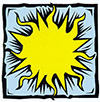1997 Recognition Award Winners
Ameritech/Corporate Real Estate
Program Coordinator: Diana Sabon
Ameritech/Corporate Real Estate instituted a pilot telecommuting program in 1994 to improve customer responsiveness. The program has expanded to involve 1,500 employees, as it has been found to be a sound strategy for reducing auto-related emissions by reducing the frequency of commuting.
- Telework is defined as employees who access work remotely two or more days a week from an alternative location other than the traditional office.
- Ameritech initiated the telecommuting pilot program in 1994, expanded it in 1995 and successfully reduced real-estate needs by 28%.
- Ameritech currently has about 1,500 teleworkers in a variety of positions.
- Participants receive formal training for teleworking through a two hour training session and guidebook.
- Productivity is tracked, and participants, their supervisors, and co-workers are surveyed to insure success.
- Telework was promoted as an option to daily commuting along Highway I-94.
- Ameritech found that telework could save employees up to four hours per day of commuting time.
- Teleworkers cited significantly lower stress, fewer interruptions, and immense increases in productivity as major benefits.
- Telework also met some of Ameritech’s other corporate objectives, such as improved employee morale and effectiveness, reduced operating costs, and reduced auto emissions.
- Ameritech hopes to have 10,000 employees working from home by 2000.
Case Corporation
Program Coordinator: Audrey Van Dyke
Case Corporation initiated an aggressive pollution-prevention program and successfully reduced emissions while increasing product quality and production levels. At the same time, it implemented several additional programs to increase employee awareness about the value of voluntary efforts to improve air quality.
- Reduced rate of emissions by 29,000 pounds at the tractor manufacturing plant by making process-based changes.
- Participated in the School + Business = Clean Air program by displaying student posters in their lunch/break room.
- Sent each student a toy (Case) tractor and thank-you letter for helping to raise employee awareness of air quality issues. Also published an article about and picture of the students in its employee newsletter.
- Sent a memo to all employees on how to limit ozone-producing activities at home and at work, especially on Ozone Action Days.
- Employees were notified of an Ozone Action Day through e-mails, broadcast voice messages, and electronic message boards.
- Postponed landscape maintenance on Ozone Action Days.
Quad/Graphics, Inc.
Program Coordinator: Chris Rynish
- Sponsors a Milwaukee County Transit System (MCTS) route from Milwaukee to its plants in Sussex and Pewaukee. Ridership in 1997 (through October) totaled 49,294 riders.
- Sponsors a Milwaukee County Transit System (MCTS) route serving its West Allis plant. Ridership in 1997 (through October) totaled 17,456 riders. The route will be extended in the future. Offers purchase of discounted tickets on-site.
- Offers one month of free ridership to new first time riders.
- Maintains transportation-information centers at each of its Milwaukee-area plants. Provides information on transit routes, the Rideshare program, carpooling, vanpooling, and park-and-ride lots. Also, two employees have been assigned responsibility for addressing transit-related questions.
- Supports and promotes Ozone Action Days by posting announcements and information on its e-mail system for all employees.
- Utilizes a compressed work week (CWW) for all production employees (75% of its workforce). In comparing this schedule to 8-hour shifts, Quad estimates that its CWW schedule saves 436,800 work trips, 7,862,400 miles traveled to work, and 393,120 gallons of gas consumed for work-related trips.
- Continues to reduce emissions from manufacturing operations by developing and utilizing latest technologies, best management practices (BMPs), and material substitution. Reduced 11,826 pounds of VOCs from ink jet printing between 1995 and 1996 using solvent recovery systems. Reduced 1,210,924 pounds of VOCs from printing operations at the Lomira, Sussex, Pewaukee, and West Allis plants in 1996 (compared to 1990 figures). Reduced 93,294 pounds of VOCs between 1992 and 1996 from printing operations in Hartford.
University of Wisconsin – Milwaukee
Program Coordinator: Jim Marsho
As the second-largest trip generator in southeastern Wisconsin, it has resisted the conventional solution (contruct new parking garages) and, instead, has taken steps to encourage students, staff, and faculty to use transit and contribute to improved air quality.
- There is no “free” parking and permits are expensive.
- Transit options include Milwaukee County Transit, Wisconsin Coach Lines, and numerous Park & Ride and U-Park special lots.
- Through a partnership with transit providers, it has issued transit passes (U-Pass) to all students, who pay a reduced price for the passes in their student fees and may utilize the bus pass for any trips during the semester.
- A program has been developed for faculty and staff that offers further incentive for transit use by allowing occasional free parking. For every 20 tickets or two weekly bus passes purchased, they receive a one-day parking permit for their choice of day. As of October, 1997, 83 faculty and staff are participating in the program.
- Sells tickets on-site to Milwaukee County Transit System and Wisconsin Coach Lines.
- Utilizes propane or other alternative fuels for equipment and vehicles.
- Participated in a workgroup formed to reduce trips along Highway I-94. Instrumental in altering Wisconsin Coach Lines route to include UWM and to honor the U-Pass. Currently has 120 new riders, which equates to 5-6 city blocks of on-street parking.
Honorable Mention
In addition to the winners listed above, the following organizations received “Honorable Mention” consideration.
- Community Memorial Hospital
- Marquette University
- MGIC Mortgage
- Washington County
